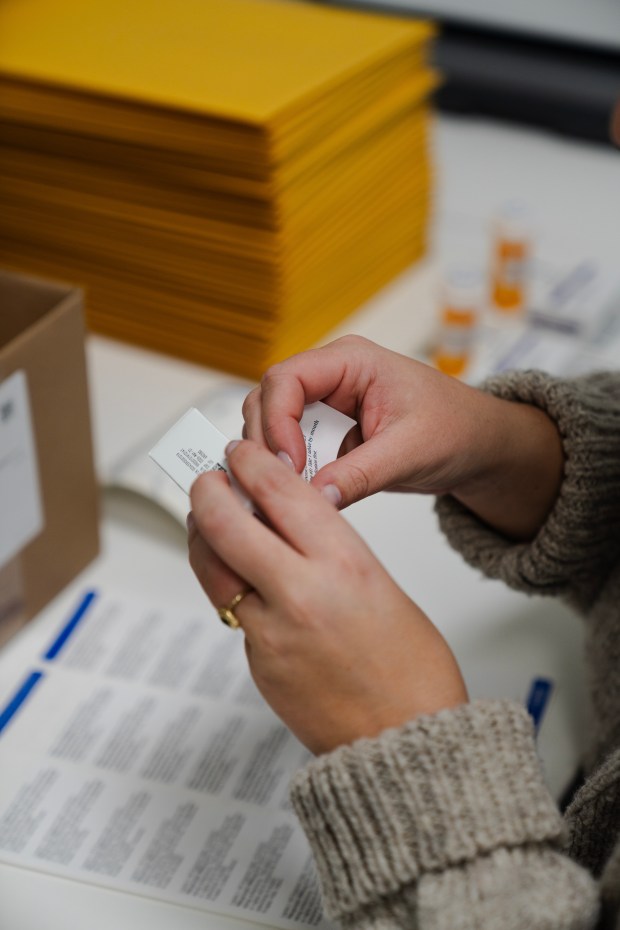As the drugstore chains Walgreens and CVS Health plan to begin dispensing the controversial abortion pill mifepristone, Illinois reproductive rights advocates praise the new means of access to the medication — which they say will improve health equity as well as help destigmatize abortion.
Abortion opponents, however, have decried the move, fearing the distribution of the popular abortion medication at well-known retailers will normalize terminating a pregnancy.
Dr. Amy Whitaker, chief medical officer at Planned Parenthood of Illinois, said the availability of abortion pills at drugstores with a prescription will “let people get the care they need in the way that works best for them.”
“We believe medication abortion pills should be treated like any other prescription,” she added. “Abortion care should be treated like any other health care. Making medication abortion pills available in pharmacies moves in the right direction toward making abortion care considered and treated like the basic health care that it is.”
Yet Eric Scheidler, executive director of the Chicago-based Pro-Life Action League, said it’s “horribly disappointing” that patrons will be able to “just walk into your neighborhood pharmacy and procure an abortion pill.”
“I’m distraught about it,” he said. “They’re trying to normalize the abortion pill in way that it just isn’t normalized if you can only get them from Planned Parenthood or other abortion providers directly.”
Walgreens and CVS recently announced their intent to distribute the abortion drug by prescription in states where the medication is legal, after the two drugstore chains were certified to dispense the drug by the Food and Drug Administration.
President Joe Biden called the decision “a milestone” in enabling access to the abortion medication and encouraged all pharmacies to follow suit.
“With major retail pharmacy chains newly certified to dispense medication abortion, many women will soon have the option to pick up their prescription at a local, certified pharmacy — just as they would for any other medication,” he said in a statement last week.
The move comes as the U.S. Supreme Court weighs a challenge from conservative groups who are trying to curb access to and use of mifepristone. The high court could decide to limit the use of mifepristone to earlier in pregnancy or require an in-person appointment with a physician for a prescription, which would curtail telehealth services and pill-by-mail programs that have significantly expanded access to medication abortions in recent years.
The Supreme Court is expected to hear oral arguments on the mifepristone case on March 26.
A Walgreens official said the Deerfield-based company plans to begin dispensing the medication within a week at “select locations” in Illinois, as well as California, New York, Pennsylvania and Massachusetts.
“We are not disclosing specific locations,” said Walgreens spokesman Fraser Engerman.
The Pro-Life Action league plans to protest the retailer’s decision to dispense mifepristone at Walgreens headquarters on March 26, the day of the Supreme Court is scheduled to hear oral arguments on mifepristone, Scheidler said.
Scheidler added that he believes the Biden administration is encouraging pharmacy retailers to dispense the medication “to make abortion seem perfectly normal.”
“It’s an incredibly traumatizing experience to go through one of these (medication) abortions and that story isn’t being told,” he said. “I hope this will be an opportunity for us to talk about these realities and how horrible this experience really is for so many women.”
A CVS Health spokeswoman said the drugstore chain plans to begin filling prescriptions for the mifepristone in Massachusetts and Rhode Island “in the weeks ahead” and will expand to other states where the medication is legal “on a rolling basis;” she did not say when it might be available at stores in Illinois.
Both retailers say they plan to carry mifepristone in brick-and-mortar stores but do not plan on providing the medication to patients via mail.
CVS Health Corp. is the country’s largest drugstore chain with nearly 9,400 locations; Walgreens Boots Alliance Inc. has around 8,700 stores nationwide, according to The Associated Press.

Mifepristone is one of two drugs generally used in medication abortions, which are approved for use up to 10 weeks in pregnancy by the FDA.
First the patient takes mifepristone to dilate the cervix and block the pregnancy hormone progesterone; the second medication, misoprostol, is taken about 24 to 48 hours later, to cause the uterus to contract and expel the pregnancy.
More than 5 million patients have taken mifepristone since it was approved by the FDA in 2000, according to the American College of Obstetricians and Gynecologists, which calls mifepristone “safe, essential reproductive health care.”
Long-standing FDA regulations used to required mifepristone be dispensed in-person at a hospital, health center or other designated medical location.
But in 2021, the FDA rolled back that mandate, allowing patients to have a telehealth visit with a health care provider and receive mifepristone in the mail, in states where the drug is legal. Pharmacies are also now permitted to distribute mifepristone upon completion of an FDA certification process.
Across the nation, more than half of all pregnancy terminations are medication abortions as opposed to procedures, according to the Guttmacher Institute, a research group that supports abortion rights.
Medication abortions also account for more than 50% of all terminations at Planned Parenthood of Illinois, which has 18 clinics statewide, though most are in the Chicago area.
In April 2022, Planned Parenthood of Illinois also began offering abortion pills by mail for in-state patients who qualify, but only about 3% of medication abortion patients choose to have the drug shipped by mail, agency officials said.
If access to mifepristone is curtailed by the Supreme Court, Planned Parenthood of Illinois officials have said they plan to continue offering medication abortions with multiple doses of misoprostol — a prescription drug used to treat various other health conditions that would still be available — instead of the mifepristone-misoprostol combination, as needed.
However, health experts say misoprostol alone is slightly less effective; a misoprostol-only regimen can be more difficult for patients, particularly those traveling for care, because it can require a dose of the medication every three hours or so, for three to four rounds of doses, depending on the gestation of the pregnancy, Planned Parenthood of Illinois officials say.
Illinois Right to Life Executive Director Mary Kate Zander said she believes the Supreme Court will decide to tighten restrictions on mifepristone.
“Under the Biden administration, the FDA has removed virtually all restrictions and rules on the dispensation of mifepristone, which hugely puts women at risk,” she said. “I anticipate that the Supreme Court will act accordingly in light of that reality.
As for CVS and Walgreens planning to dispense mifepristone, one downstate Illinois abortion provider called this “a significant move in improving access to essential reproductive health care services.”
“However, let’s not overlook the harsh reality that many individuals in states with strict abortion laws won’t benefit from this decision,” said Jennifer Pepper, president and CEO of CHOICES Center for Reproductive Health, which has a clinic in Carbondale. “While we celebrate this progress, we must stay vigilant in advocating for comprehensive reproductive health care access for all.”
Fourteen states have banned abortion in nearly all circumstances and others have severely restricted terminating a pregnancy following the U.S. Supreme Court’s June 2022 decision to overturn Roe v. Wade, the landmark ruling that established abortion rights nationwide in 1973.
Illinois abortion providers say the number of out-of-state patients has surged since the demise of Roe,
In 2022, the year Roe fell, nearly 17,000 patients crossed state lines to terminate a pregnancy in Illinois, a 49% spike from the roughly 11,000 traveling abortion patients the previous year, according to the Illinois Department of Public Health.
Pepper noted that the majority of patients at her Carbondale health center travel there from states where the law won’t permit retail pharmacies to offer mifepristone.
“Meaning they’ll still have to leave their communities for essential health care, highlighting the persistent disparities in abortion access across different geographic regions,” she added.
The Associated Press contributed.




